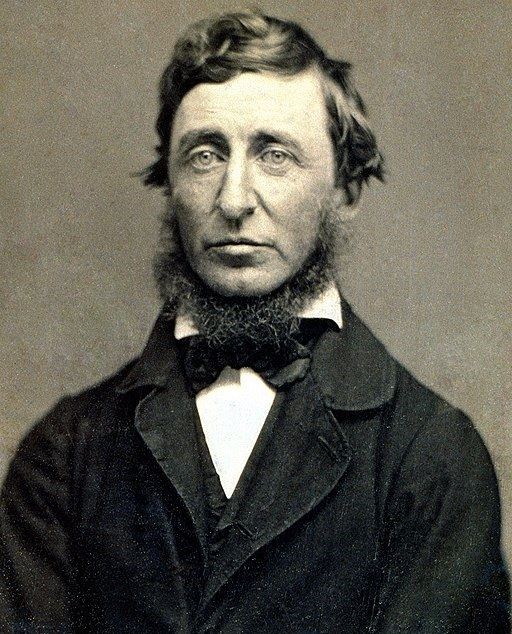Many pieces of literature written by Thoreau have a purpose to show others the inequities of slavery and the Mexican-American War. "Civil Disobedience," one of Thoreau's famous essays, describes Thoreau's taxpayer's rebellion against the Federal government in protest against the war with Mexico. A tax collector demanded that Thoreau pay six years of uncollected tax, but Thoreau refused to do so because he knew the money would go to fund the Mexican-American War. So he voluntarily got imprisoned in jail until an anonymous person paid the toll for him. After he got released from confinement, he wrote "Civil Disobedience," stating that the government was a catalyst to exploitation. It was said that "he devoted both his writing and his life increasingly to public issues" (Encyclopedia of World Biography). After John Brown's raid on Harper's Ferry, many disapproved of Brown's action. Enraged by the people who criticized Brown, Thoreau wrote "A Plea for Captain John Brown" to defend the abolitionist. The situation was able to come around when Brown was declared a "martyr" by many supporters who contemplated Thoreau's speech. "A Plea for Captain John Brown" was able to sway many to praise Brown for his brave deed.
 Henry David ThoreauNational Portrait Gallery [Public domain] via WikimediaThoreau was a man who stood for goodness despite an overwhelming conformity, such as racial discrimination. He believed in the idea that everyone should be respected equally, no matter if their skin is a different color. He stated, "I please myself with imaging a State at last which can afford to be just to all men and to treat the individual with respect as a neighbor." In an earlier time period, there were abolitionists who provided refuges for runaway slaves, so Congress adopted the Fugitive Slave Law; a law that placed a very severe punishment if one is found sheltering fugitive slaves. The opposers will be charged with a fine of an enormous amount of money. But Thoreau did not back down; during the night, he would sneak in runaway slaves and hide them at his parents' house. Furthermore, he would supply them with the things they need for their trip towards a new life. Thoreau also believed in living simply with only the necessities of life, and not the materialistic items used for the pleasure of one own comfort. In Walden, Henry explained, "I went to the woods because I wished to live deliberately, to front only the essential facts of life." To prove that one can live with only the simplest things in life, he spent his life in a cabin that he built himself in the woods for a couple of years. Thoreau was able to survive only relying on the goods that were produced from his labor.
Henry David ThoreauNational Portrait Gallery [Public domain] via WikimediaThoreau was a man who stood for goodness despite an overwhelming conformity, such as racial discrimination. He believed in the idea that everyone should be respected equally, no matter if their skin is a different color. He stated, "I please myself with imaging a State at last which can afford to be just to all men and to treat the individual with respect as a neighbor." In an earlier time period, there were abolitionists who provided refuges for runaway slaves, so Congress adopted the Fugitive Slave Law; a law that placed a very severe punishment if one is found sheltering fugitive slaves. The opposers will be charged with a fine of an enormous amount of money. But Thoreau did not back down; during the night, he would sneak in runaway slaves and hide them at his parents' house. Furthermore, he would supply them with the things they need for their trip towards a new life. Thoreau also believed in living simply with only the necessities of life, and not the materialistic items used for the pleasure of one own comfort. In Walden, Henry explained, "I went to the woods because I wished to live deliberately, to front only the essential facts of life." To prove that one can live with only the simplest things in life, he spent his life in a cabin that he built himself in the woods for a couple of years. Thoreau was able to survive only relying on the goods that were produced from his labor.
 |
| House belonging to Henry David Thoreau Unknown author / [Public Domain] via Wikimedia |
Thoreau once said, "I learned this, at least, by my experiment: that if one advances confidently in the direction of his dreams, and endeavors to live the life which he has imagined, he will meet with a success unexpected in common hours." He did what he said he would do, and he accomplished it. When he wanted to live simply, he built a cabin in the woods and when he disapproved of slavery, he wrote essays, poems, and speeches to express his opposition to slavery. On top of that, when he did not agree with how the government operated, he rebelled. Thoreau is an inspiration because he chose how he wanted to live his life. He did not care about the consequences; he stayed true to his views of the government. He wanted to make a difference in the world for, "one is not born into the world to do everything but to do something." Henry David Thoreau is definitely a hero and an inspiration to all.
Page created on 5/25/2013 12:00:00 AM
Last edited 5/14/2025 12:35:51 PM
"Henry David Thoreau." Encyclopedia of World Biography. Detroit: Gale, 1998. Biography in Context. Web 29 Apr. 2013.
Meltzer, Milton. Henry David Thoreau: A Biography. Minneapolis: Twenty-First Century, 2007. Print.
Thoreau, Henry David. "Henry David Thoreau Quotes." Henry David Thoreau Quotes. N.p., n.d. Web. 22 May 2013.
Thoreau, Henry David., and Stephen Fender. Walden. Oxford: Oxford University Press, 1997. Print.
